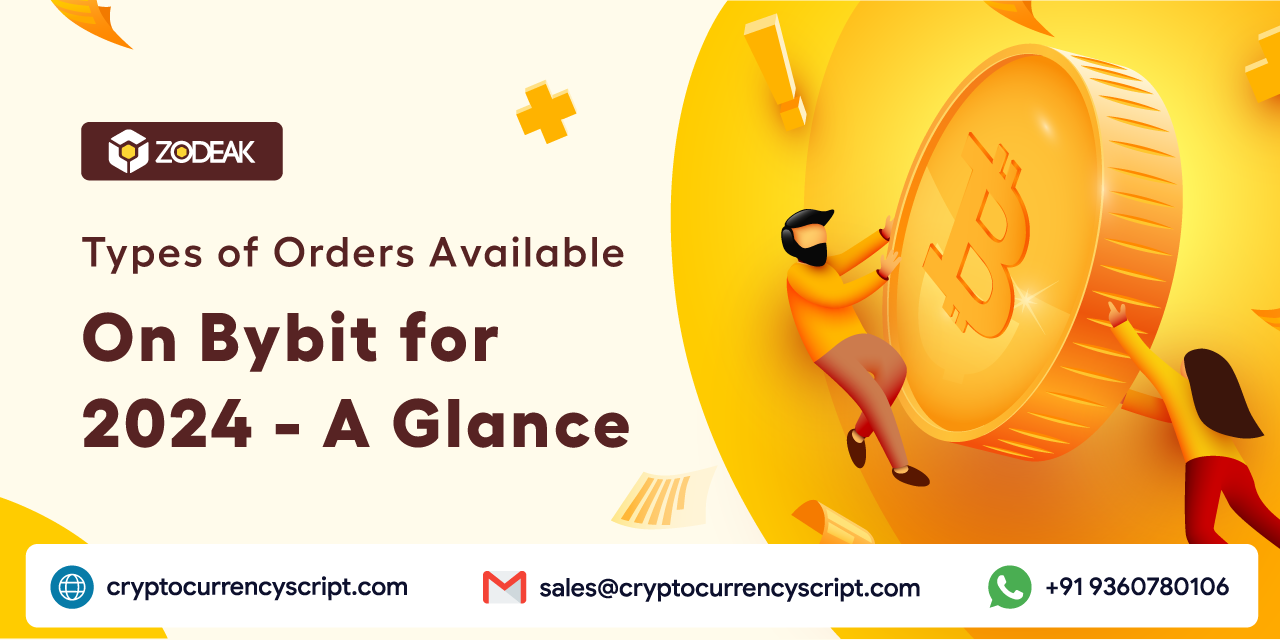Bybit, the top centralized crypto exchange ranked after Binance, as per the CoinMarketCap report. It has also received the ‘Centralized Crypto Exchange of the Year’ award at the Dubai World Trade Centre. With this, it stands out in the market by providing various spot and derivatives trading tools. To successfully trade, it is crucial to have a deep understanding of the various types of orders available on Bybit.
There are two main types of orders, each with its own sets of subtypes, that you should be familiar with.
- Basic Order Type – Market, Limit, and Conditional Orders.
- Advance Order Type – Take Profit/Stop Loss, Iceberg Orders, etc.
By understanding the detailed array of types of orders available on Bybit, anyone can make well-informed trading decisions. Whether you’re a new trader seeking knowledge or an entrepreneur in search of a variety of order types to integrate into your platform, Bybit is the ideal destination.
Below, in brief, we will go through every type of order available on Bybit.
Basic Order Types
Bybit provides three Basic order types – Market Order, Limit Order, and Conditional Order. These orders serve as the foundation for more advanced trading approaches and strategies. By understanding these types, traders can effectively increase their chances of success.
Market Order
A Market Order is the simplest and quickest way to execute a trade. When you place a Market Order on Bybit, it is immediately filled at the best available price, ensuring swift entry or exit from a position.
While Market Orders offer instant execution, it’s essential to note that the execution price may experience minor shifts due to market volatility, resulting in what is known as slippage. Traders using Market Orders are considered market takers, extracting liquidity from the market, which incurs slightly higher fees known as taker fees.
Limit Order
Limit Orders provide traders with greater control over the execution price. By specifying the exact price at which you want to buy or sell an asset, a Limit Order ensures execution at that price or a better one.
However, there’s a risk of the order not being executed if the market doesn’t reach the specified price. Limit Orders can either add liquidity to the order book, earning a lower maker fee or be filled immediately at the best available price, incurring a taker fee.
Conditional Order
Conditional Orders add a layer of automation to trading strategies. Triggered by specific conditions, such as a trigger price, these orders are placed into the order book.
Bybit supports two types of Conditional Orders: Conditional Market and Conditional Limit Orders. These orders are commonly used to simulate various order types, including stop-entry orders, take profit, and stop-loss orders.
Advanced Order Types
Having grasped the basic order types, let’s explore the advanced order types offered by Bybit. It provides traders with a wide range of advanced order types that can be used for strategic trading. These advanced order types can help traders make more informed trading decisions and execute trades with greater precision.
Take Profit/Stop Loss Order
Take Profit (TP) and Stop Loss (SL) orders are integral components of a trader’s exit strategy. A TP order closes a position when a certain profit level is reached, while an SL order limits potential losses. Bybit’s integrated TP/SL functionality streamlines trade management, operating slightly differently in the spot and derivatives markets.
Iceberg Order
An iceberg order is a strategic approach to executing large trades without causing excessive market impact and drift. It automatically splits significant orders into discreet sub-orders, covering entire positions and allowing quick market entry. Ideal for market makers, Iceberg orders intelligently influence market dynamics without revealing the entire position.
Post-Only
A post-only order instructs the system to place a limit or conditional limit order in the order book only if it does not immediately match an existing order. This ensures that a producer is included in the book. Traders often use post-only orders to earn producer fees and provide liquidity to the market.
Time in Force Selections
Time in Force (TIF) selections dictate how long an order remains active in the market before execution or cancellation.
By Bit offers three common TIF selections:
Good ‘Til Canceled: Remains active until manually canceled, persisting in the order book.
Immediate or Cancel: Requires immediate execution, with any unfulfilled portion canceled.
Fill or Kill: Demands immediate full execution; otherwise, the entire order is cancel.
These TIF selections provide flexibility in aligning orders with trading strategies and market conditions.
One-Cancels-the-Other Order (OCO)
OCO orders empower traders with simultaneous execution of different order types, enhancing risk management and trade automation. This functionality pairs two conditional orders, automatically canceling one when the other is trigger, providing efficiency and risk control.
Reduce-Only
The Reduce-Only order is a specialized limit order that allows traders to decrease their existing position size without increasing it. It serves as a risk management tool, preventing inadvertent increases in exposure in the market.
Close on Trigger
A close-on trigger automatically closes a position when a specific trigger condition is met. Triggered by price levels, this order type is instrumental in securing profits or managing losses, offering automated exit strategies based on predetermined trigger prices.
Trailing Stop Order
A Trailing Stop order dynamically adjusts the stop price, following the market price by a set distance or percentage. It helps lock in profits and limit losses, providing a balanced approach to capturing gains while allowing for market fluctuations.
TWAP Order Strategy
The TWAP (Time-Weighted Average Price) order is design to execute trades gradually over a specified period, aiming for an average price that reflects market conditions. This strategy minimizes market impact by breaking the order into smaller parts and spreading out their execution evenly.
Scaled Order
Scaled orders are algorithmic orders that execute large orders without causing market volatility. By splitting a large order into smaller sub-orders within a specific price range, it minimizes the impact on market dynamics and participant behavior.
Chase Limit Order
Chase limit order dynamically adjusts its entry price at the best bid or asks to match changing market conditions until filled, canceled, or reaching a maximum chase distance. It is effective for executing large orders as limit orders while minimizing waiting time and potential slippage.
Final Words
As you explore different types of orders available on Bybit, this knowledge will make you make an informed decision. If you’re a new trader, it’s important to understand these different types of orders available on Bybit. And for startup founders, include these things in their trading platform while development. Moreover, if you’re seeking more information or are considering launching your crypto exchange, Zodeak’s Bybit clone script is an optimal solution for you. You can learn more about this solution and even request a demo by simply clicking the button below.





